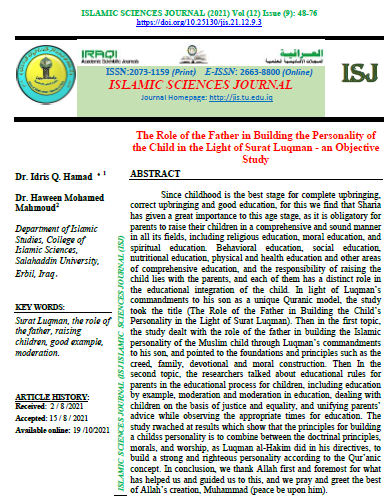The Role of the Father in Building the Personality of the Child in the Light of Surat Luqman - an Objective Study
Main Article Content
Abstract
ABSTRACT
Since childhood is the best stage for complete upbringing, correct upbringing and good education, for this we find that Sharia has given a great importance to this age stage, as it is obligatory for parents to raise their children in a comprehensive and sound manner in all its fields, including religious education, moral education, and spiritual education. Behavioral education, social education, nutritional education, physical and health education and other areas of comprehensive education, and the responsibility of raising the child lies with the parents, and each of them has a distinct role in the educational integration of the child. In light of Luqman’s commandments to his son as a unique Quranic model, the study took the title (The Role of the Father in Building the Child’s Personality in the Light of Surat Luqman). Then in the first topic, the study dealt with the role of the father in building the Islamic personality of the Muslim child through Luqman’s commandments to his son, and pointed to the foundations and principles such as the creed, family, devotional and moral construction. Then In the second topic, the researchers talked about educational rules for parents in the educational process for children, including education by example, moderation and moderation in education, dealing with children on the basis of justice and equality, and unifying parents’ advice while observing the appropriate times for education. The study rwached at results which show that the principles for building a childss personality is to combine between the doctrinal principles, morals, and worship, as Luqman al-Hakim did in his directives, to build a strong and righteous personality according to the Qur’anic concept. In conclusion, we thank Allah first and foremost for what has helped us and guided us to this, and we pray and greet the best of Allah’s creation, Muhammad (peace be upon him).
Article Details

This work is licensed under a Creative Commons Attribution 4.0 International License.
COLLEGE OF ISLAMIC SCIENCES, TIKRIT UNIVERSITY. THIS IS AN OPEN ACCESS ARTICLE UNDER THE CC BY LICENSE http://creativecommons.org/licenses/by/4.0/

